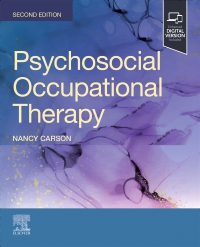Psychosocial Occupational Therapy, 2nd Edition
by Nancy Carson, PhD, OTR/L, FNAP, FAOTA
Paperback
ISBN:
9780443115837
Copyright:
2026
Publication Date:
01-14-2025
Page Count:
320
Imprint:
Elsevier
List Price:
$91.99
Develop the psychosocial skills to treat and address the mental health needs of clients in all practice settings! Psychosocial Occupational Therapy, 2nd Edition, uses evidence-based models to demonstrate effective occupational therapy for clients diagnosed with mental health conditions. Clearly and logically organized, the book begins with theories and concepts and follows with in-depth coverage of OT interventions in both individual and group contexts. Case studies and models show how to apply the fourth edition of the Occupational Therapy Practice Framework (OTPF) in selecting treatment strategies.
-
-
- UPDATED! AOTA’s Occupational Therapy Practice Framework, 4th Edition, and current OT practice are reflected throughout the book to ensure alignment with the latest OT guidelines for education and practice
- NEW! Complementary and Integrative Health chapter provides an overview of complementary approaches that have expanded in use within health care and includes examples of how to effectively incorporate them into OT treatment
- UNIQUE! At least two cases studies in each clinical chapter show how to apply the Occupational Therapy Practice Framework (OTPF) in determining treatment options, and one or more conceptual models address the psychosocial needs of clients
- NEW! Feeding and Eating Disorders chapter offers more in-depth information on eating disorders included in the DSM-5, along with the OT’s role in treatment
- NEW! Enhanced ebook version, included with every new print purchase, allows access to all the text, figures, and references, with the ability to search, customize content, make notes and highlights, and have content read aloud
- Using the Occupational Therapy Practice Framework chapter describes how to apply the 4th edition of the OTPF to the practice of occupational therapy
- Balanced approach to psychosocial occupational therapy includes thorough coverage of primary diagnoses, as well as occupational and psychosocial theories, models, and approaches
- Emphasis on clinical reasoning skills provides insights on how to select treatment strategies based on the conceptual theories and models presented in the earlier chapters; the information on diagnoses also references the DSM-5
- A focus on psychosocial skills makes it easier to adjust the method of approaching a client, the nature of the therapeutic relationship, and the direction and eventual outcomes of intervention - regardless of the setting or the primary diagnosis
- Coverage of therapeutic interaction skills and group process skills shows how to provide treatment in both individual and group settings
-
Part 1: Introduction
1. Occupational therapy in mental health: Historical and current perspectives
2. Therapeutic interpersonal skills
3. Group processes
4. Using the occupational therapy practice framework
Part 2: Theoretical approaches and occupational therapy assessment
5. Occupation-centered practice models
6. Psychosocial theories
7. Cognitive approaches
8. Sensory modulation
Part 3: Mental illness and occupational therapy practice
9. Mood disorders
10. Anxiety disorders
11. Schizophrenia
12. Substance use disorders
13. Neurocognitive disorders
14. Feeding and eating disorders
15. Other psychiatric diagnoses
Part 4: Practice considerations
16. Emotional impact of physical illness or injury
17. Pediatric mental health
18. Trauma-informed care
19. Complementary and integrative health
20. Prevention and advocacy
-
Nancy Carson, PhD, OTR/L, FNAP, FAOTA, Associate Dean and Professor, Division of Occupational Therapy, College of Health Professions, Medical University of South Carolina, Charleston, South Carolina



 as described in our
as described in our 